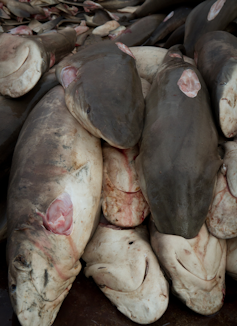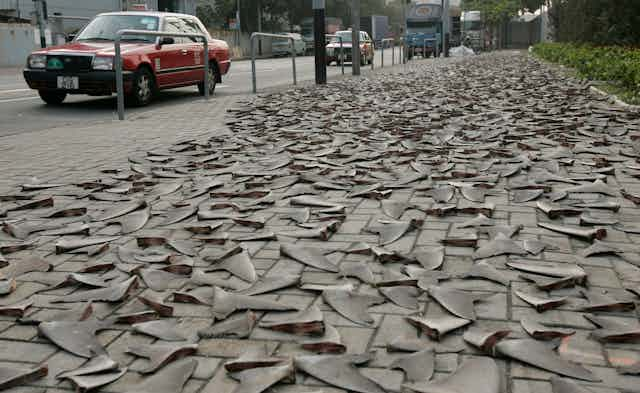Another critically endangered grey nurse shark has washed up on a northern NSW beach, with its fins removed. Shark fins are valued at more than A$400 per kilogram. This high market value encourages the practice of finning, where the shark’s fins are removed and the torso discarded at sea, usually while the shark is still alive. The sharks asphyxiate and occasionally wash up on shore, as seen last week at Evans Head, New South Wales.
The grey nurse shark population on the east coast of Australia is estimated at less than 500. So what is being done to prevent the extinction of this apex predator?
State and federal governments have legislated against shark finning and have given fisheries management the power to search vessels and detain those found with illegal catches. However, due to the sheer size of the Australian coastline, fisheries management rely heavily on self-reporting to ensure compliance with fishing regulations.
Australia is a signatory to three international agreements designed to address finning. These are the Food and Agricultural Organisation’s International Plan of Action (FAO-IPOA) to Prevent, Deter and Eliminate IUU Fishing, the FAO-IPOA for Conservation and Management of Sharks, and the Convention on International Trade in Endangered Species (CITES).
All of these require members to implement plans to protect endangered species, such as grey nurse sharks.

All states and the Commonwealth have outlawed shark finning, in line with their commitments to the FAO and CITES. But despite this, Australia exported 206 tonnes of shark fin between January 2007 and February 2008. This is far more than fishers report to regulators that they’d caught during the same period.
Why do we allow this industry to continue to operate in contradiction of our commitments to the FAO and CITES? It is because it is so difficult to effectively regulate such a dispersed industry. The result has been reliance on systems of self-reporting.
In order to comply with state and federal regulations, fishers must keep log books. These can be reviewed upon request, while their vessels can also be boarded by fisheries officers. The Australian Institute of Criminology notes that 80-90% of commercial and recreational fishers are compliant.
They say high-value products, such as shark fins, destined for overseas markets are likely caught by those involved with organised crime. It is unlikely that the latter group will abide by the self-reporting systems such as logbooks. They can only be caught by on-the-ground fisheries officers.
Regulation of the fishing industry is not dissimilar to regulation in other industries, including agriculture and forestry. In these industries, the government sets the rules and allows industries to self-monitor. In the case of fishing, state and federal bodies can search and detain the vessels of suspected illegal fishers. But their ability to do so is constrained - there are a lot of fishers out there and not enough funding to search them all. There are also concerns about training and personal safety when engaging with more sophisticated illegal fishers – especially those associated with organised crime.
In a 2005 survey, fisheries officers said illegal fishers used a number of evasion methods. They hid catches, knew the movements of inspections officers, avoiding landing at inopportune times, and used intelligence and lookouts to avoid officers. The same report noted that the more sophisticated the offender, the more complex their avoidance tactics were.
The methods outlined in the report suggest that self-regulation doesn’t stop fishers committing acts that threaten endangered species, including grey nurse sharks.

It is obvious that with an area as large as the Australian coastline, fisheries officers and governments are limited in their onboard monitoring. So what are the alternatives to the current system?
The NSW Greens have called for a complete ban on Australian shark fin exports, suggesting that closing down the end market will cut off demand for the product. Other suggestions have included rewarding third party policing – or encouraging other fishers to “dob in” offenders. Fisheries officers say more seconded police officers would help them defeat organised criminals engaged in illegal fishing.
Self-regulation of the fishing industry is doing little to prevent the deterioration of Australia’s grey nurse population. Those who abide by the voluntary regulatory requirements are unlikely to be the same fishers cutting the fins off sharks. Regulation of the fishing industry needs to address this fishing through a combination of the suggested solutions above.
Critically endangered species such as the grey nurse shark require more protection than the current system provides.

